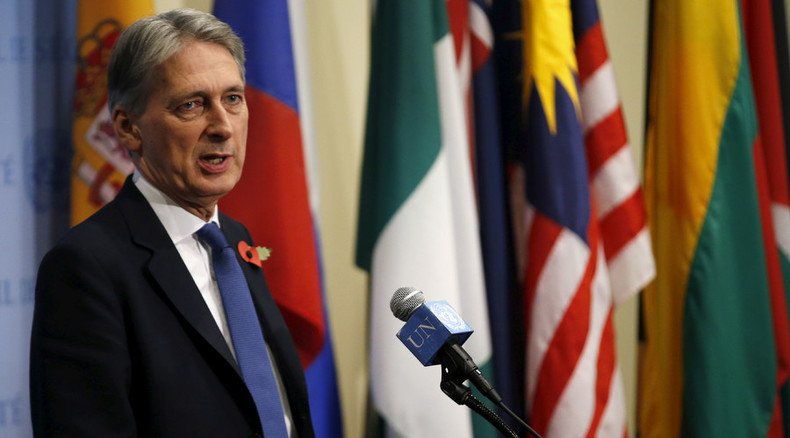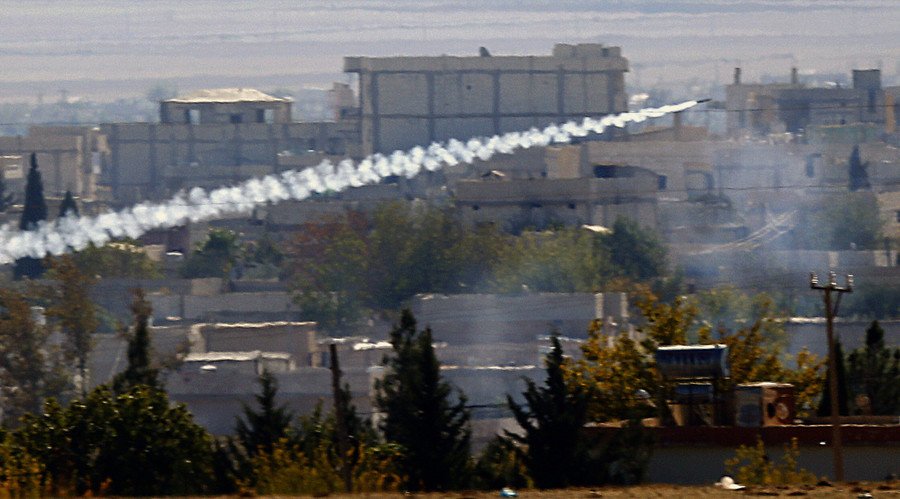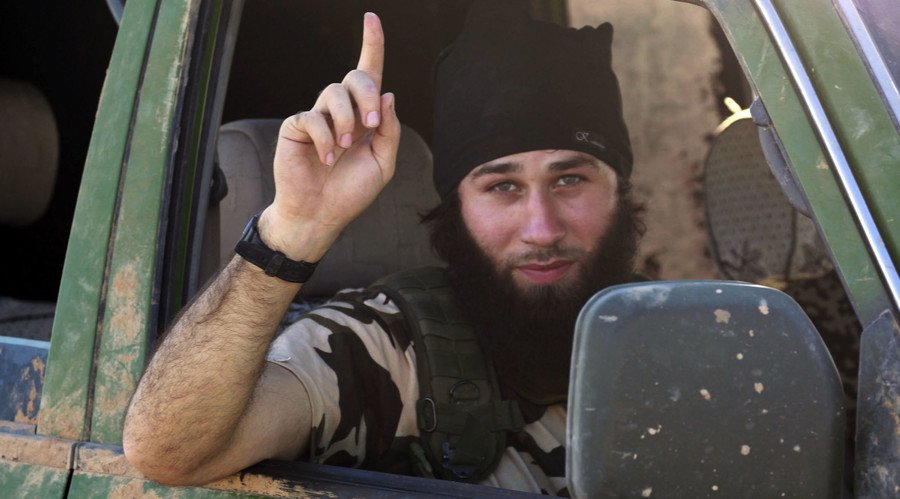A ‘warning shot’- The crazy logic of UK’s Hammond and what lies behind it

Just imagine if the Russian Foreign Minister had said after the 7/7 London bombings in 2005 that the act of terrorism was a 'warning shot' for the UK and that he hoped it would make the UK's foreign policy more flexible.
There would I’m sure, be a massive outcry. The Russians were shamefully condoning terrorism, we'd have been told. How sick of them to call the bombs a 'warning shot' and hope that they changed UK policy! One can only imagine what the headline of the Sun would have been (“NO WAY, SERGEYI!” would be my bet). Yet this is what British Foreign Secretary Philip Hammond said in the aftermath of the Russian plane tragedy in the Sinai - and very few people- certainly in Western leading circles seemed outraged.
This glaring double standard is not the only thing which is noteworthy about Hammond’s comments. Let’s look at the logic behind what the Foreign Secretary is saying.
By calling it a ‘warning shot’ to Russia he is effectively saying that ISIS is hitting back in response to Russia’s bombing in Syria. OK - that seems logical enough - especially in the light of this weekend’s events in Paris. But hang on a minute. Don’t you remember how Hammond and his fellow neocons spent the weeks leading up to the telling us how Russia WASN’T really targeting ISIS, but instead hitting ’civilians’ and moderate rebels? The Daily Beast even ran an article entitled ‘Russia’s giving ISIS an air force’.
Speaking at the Conservative Party conference on October 4, Hammond effectively accused Russia of lying about attacking ISIS. “You have a strong propaganda message that says you’re doing one thing while in fact you are doing something completely different and when challenged you just flatly deny it,” he declared. “You try talking to the Russians,” he went on. “They just keep repeating their position - that is by the way also the Iranian position - and it is just incredible.”
.@PHammondMP Russian actions in Syria are legitimate by intl law, unlike those of others.We're acting on Govt request pic.twitter.com/bAeAWHup5r
— Russian Embassy, UK (@RussianEmbassy) 1 октября 2015But if what Hammond said at the Tory conference was true why would the Islamic State then bomb a Russian plane? You can’t say on one day that Russia is helping ISIS and that ISIS is gaining ground because of Russian actions and the next day claim that ISIS is bombing a Russian airline because they are, er.. angry with Russia. Or rather you can say that, if you think that if you’re a neocon and arrogantly think that whole of the Western world are a bunch of total simpletons with memories that only go back a few hours.
So weird that ISIS is spewing hatred & threats at Russia because @thedailybeast told us Russia was ISIS's Air Force https://t.co/WT1hY8yRsf
— Glenn Greenwald (@ggreenwald) 4 ноября 2015That's not the only thing that doesn’t add up. UK hawks like Hammond, and former Defence Secretary Liam Fox, have used the alleged bringing down of a Russian civilian plane (which they’re sure was done by ISIS) to give another big push to their argument Britain should be bombing the Islamic State too - as it would make British citizens safer. Again, let’s just think about this one for a minute.
If, as Hammond says, the plane accident was a 'warning shot' for Russia, how will bombing ISIS make British citizens safe? Surely it would mean British planes full of tourists would be targeted by ISIS too? The hawks are effectively saying to us: “That man over there was badly stung because he stirred up a hornet’s nest. To make us safe from being stung, we need to stir up the hornet’s nest too.” They want their country to do the very thing that they claim brought on an attack on another country - and all because they want to make their country safe. It’s all very reminiscent of the arguments that neocons like Hammond made in the lead up to the Iraq war. (Hammond by the way ‘consistently voted in favor of the Iraq war’)
We were told we had to attack Saddam Hussein because he was a very evil man who had WMDs which threatened us and which could be ready for use within 45 minutes. But if he did have WMDs then why do the very thing that would provoke the very evil man to use them?
You didn’t have to be a professor of logic to see the holes in the neocons arguments in 2002/3 and you don’t have to be one now to see the equally big holes in their arguments in 2015. But there is, I believe, a method in the madness.
Firstly, it was of paramount importance for Western hawks to insist that the plane crash was as an ISIS bomb - even at a time when it was still uncertain what could have brought the plane down - in order to pressurize Russia to re-evaluate its intervention in Syria which is doing great harm to the Islamic State.
The problem of course is that the ’warning shot’ line contradicts the earlier official narrative that Russia wasn’t hitting ISIS. The hawks are clearly hoping that we’ve all forgotten about that. But the positives from coming out quickly and blaming Islamic State strongly outweighed the negatives. That’s because of point two.
At the moment there’s a real need to boost support for Britain’s bombing of Syria ostensibly against ISIS, but with the real aim of hastening the demise of the secular Assad government which has been fighting ISIS. For the neocons, the timing of the Metrojet tragedy, as my OpEdge colleague Dan Glazebrook noted here, was perfect.
"some US officials are 'secretly delighted' that 224 Russian civilians were killed by ISIS." Because neocons. https://t.co/E7rzdOn3UQ
— Bryan MacDonald (@27khv) 10 ноября 2015Only a few days before the Metrojet tragedy, we’d read how the British government was having to postpone its plans for a Parliamentary vote on bombing Syria as it was clear that they would not get a majority in the Commons.
The alleged downing of the plane could be - and was - used by the hawks to strengthen their case that Britain had to ‘intervene’ in Syria. We had to go in and attack the people that Russia was only pretending to fight but who nevertheless had downed a Russian plane.
For many, British government’s policy on Syria appears hopelessly inconsistent. In 2013, we were told we had to go to intervene in Syria to stop Assad; in 2015, the same people are telling us we have to intervene in Syria to stop ISIS. But there really is no inconsistency, once one understands that even before the so-called Arab Spring hit Syria in early 2011, David Cameron and his fellow neocons were hell-bent on regime change.
We know from WikiLeaks that US plans to overthrow Assad go back to at least 2006 and we also know how closely the UK follows the US in foreign policy.
The former French Foreign Minister and Socialist politician Roland Dumas revealed that two years before the Arab Spring, he had met with top British officials who told him they were ‘preparing something’ in Syria. “Britain was preparing the invasion of the rebels in Syria… in the simple purpose of removing the Syrian government,” Dumas said.
To topple Assad, Britain and its allies planned to rely on jihadist death squads - euphemistically labeled ‘rebels’- and whose cause would be championed by neocon columnists and their faux-left allies.
But it soon became clear that the Syrian government was too strong and that direct Western military intervention would be needed to help the ‘rebels’ achieve success, as in Libya. There were attempts to get resolutions past the UN Security Council which would have opened the door to direct intervention, but these were blocked by Russia and China. In May 2013, the UK - along with France - pressurized other EU members to vote to end an arms embargo on Syrian ‘rebels’ - a move which I strongly criticized on RT in words that have sadly proved very prophetic:
“I think there will be a massive blowback from this because there’s no doubt – it’s 100 per cent sure – that if Britain and France send more weapons into this arena they will end up in the hands of groups like the Al-Nusra Front and Al-Qaeda-created groups. And these will come back to be used against British citizens in Britain perhaps and across the world. And so, we’ve got a real problem here. We’ve got a British neo-conservative government that’s actually lining up on the same side as Al-Qaeda and Islamic extremists in Syria.”

MI5 did its bit too. Terrorist trials, such as the one of Bherlin Gildo, have collapsed when it was revealed that Britain’s intelligence and security services were actually backing the same groups in Syria as the alleged terrorists.
In August 2013, there was a fresh push to get direct military intervention against Assad when news broke of a chemical weapons attack at Ghouta in the suburbs of Damascus, which was of course blamed straight away on the Syrian government, even before any evidence had been properly examined. Again, we were expected to believe some strange logic, namely that the Syrian authorities - knowing that the US and its allies were looking for a pretext to attack - used chemical weapons on their opponents at the very time that a UN chemical weapons team was in Damascus.
However, to the immense frustration of the hawks, the British Parliament voted against intervention. Hawkish Minister Michael Gove shouted at MPs who had voted against bombing a government that was fighting IS and Al-Qaeda affiliates. Neocon columnists as I described here,raged at Parliamentarians for listening to the British people (71 percent of whom supported the MPs decision on Syria) and not them.
As we headed in 2014, the problem for the Syrian regime changers was that it was abundantly clear that there was nothing very moderate about the people fighting the Syrian government. What had been dismissed as ‘Russian propaganda’ in 2012 or 2013 was now accepted by most people as the reality. The Islamic State was on the advance and Western policy had an awful lot to do with it.
ISIS would never have emerged without the indirect support of various governments. They should be ashamed of themselves.
— Richard Wellings (@RichardWellings) 14 ноября 2015The wings of ISIS had to be clipped, but the West did not want them destroyed. The US started bombing Islamic State, but it was hardly ‘Shock and Awe’. A phony war had begun, while in the meantime, arms continue to flow in to so-called ‘moderate rebels’- arms which, surprise surprise, ended up in the hands of ISIS, and Al-Qaeda affiliates.
By the middle of this summer the strategy seemed to be paying dividends. The Syrian Army had taken big hits. The Assad government looked in greater peril than at any time since 2012. The refugee crisis would be spun by the war lobby to get support for direct UK involvement in Syria.
Right on cue, Rupert Murdoch’s Sun newspaper exhorted us to Bomb Syria ‘for Aylan’.
But in September the plans all went horribly wrong. Firstly, despite the best efforts of pro-intervention ‘Blairites’ and their media cheerleaders, Labour elected an anti-war leader, Jeremy Corbyn. With a Parliamentary majority of only 12, it would be very hard for Cameron and Hammond to get a majority for bombing Syria.
If we take a closer look at the journalists and commentators who most obsessively smeared and attacked Corbyn in the leadership campaign we find a very strong overlap with those who have been calling for direct British military intervention against Assad. Corbyn posed a real threat to the regime changers’ plans - and they knew it, which is why they tried everything they could to stop him.
Even more damaging to the neocons, there was the Russian intervention. Unlike the US and its allies, the Russians really were aiming to destroy ISIS. There was no phony war here. The Russian intervention would not only be a game changer, it threatened to be a game ender.
So what to do? Straight away the regime changers’ strategy was clear- discredit the Russian anti-terrorist campaign by saying that they weren’t targeting ISIS but in fact helping to make ISIS stronger! Commentators who had showed zero concern over civilians casualties when the US was bombing Syria suddenly became terribly concerned over casualties caused by the Russian campaign. Overnight, fanatical warmongers became peaceniks. Public opinion had to be turned against the Russian operation.
But when Metrojet 9268 came down in the Sinai on October 31, there had to be a very hasty script revision: ‘Russia was attacked because it HAD been fighting IS!’
For the UK to achieve its goal of regime change in Syria two things now need to happen.

Russia must stop - or reduce significantly its anti-terrorist operation - something that Philip Hammond clearly wants to happen. Let’s reiterate his words: “We’ll see whether the Russians now double down or whether they decide that they never wanted to be too deeply engaged anyway in Syria and that this is a warning shot to them.”
Secondly, the UK must start bombing Syria and together with the US and its other allies, use military force to reverse the advances the Syrian Army has made in the past few weeks. Of course the public reason given for intervention must be that the UK government wants to do its bit in helping to defeat ISIS. The much publicized droning of ‘Jihadi John’ is meant to be proof that Cameron and co really want to get serious against Islamic State. But we know that regime change and not defeating ISIS remains the goal because if the British government really did want to defeat Islamic State they would be assisting Russia and the Syrian government in their anti-ISIS operation, and not trying all they can to undermine it. The imposition of no fly zones has been consistently called for by Western interventionists - and that alone tells us who their target is, as the Islamic State, does not have an air-force. You don’t have to be Lieutenant Colombo to work this one out.
Philip Hammond's logic might seem crazy, but it isn‘t so crazy after all, if we understand what is the UK government’s real agenda. If your aim is to topple the Syrian government, then the Foreign Secretary‘s recent utterances all make perfect sense. In fact, it would have been illogical for him to have said anything else. For all the apparent inconsistencies, we should not be fooled. There is always method in the neocon madness.
The statements, views and opinions expressed in this column are solely those of the author and do not necessarily represent those of RT.













